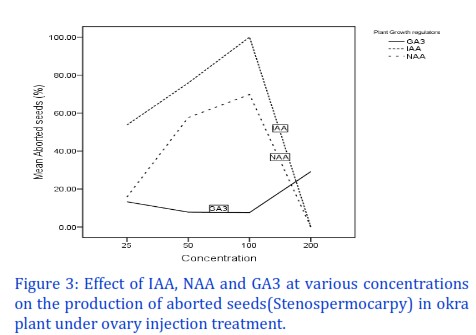
Effects of different plant growth regulators on the pod setting, aborted seed, nutrient, and vitamin C content in okra using flower ovary injection
Abstract
Keywords
Full Text:
PDFReferences
Abduljabbar, M., I. Abduljabbar and H. Shukri, 2007. Effect of sowing date, topping and some growth regulators on growth, pods and seed yield of okra. Abelmoschus esculentus: 473-478.
Davies, P., 1995. The plant hormones: Their nature, occurrence and functions. Plant hormones. Physiology, biochemistry and molecular biology. 1-12.
Deore, B. and R. Bharud, 1990. Growth, yield and storability of fenugreek as influenced by foliar spray of growth substances. Journal of Maharashtra agricultural universities, 15(2): 208-210.
Gemede, H. F., N. Ratta, G. D. Haki, A. Z. Woldegiorgis and F. Beyene, 2015. Nutritional quality and health benefits of okra (Abelmoschus esculentus): A review. Journal of food process technology, 6(458): 2.
Harrington, J., L. Rappaport and K. Hood, 1957. Influence of gibberellins on stem elongation and flowering of endive. Sience, 125(3248): 601-602.
Hilli, J., B. Vyakarnahal, D. Biradar and R. Hunje, 2010. Effect of growth regulators and stages of spray on growth, fruit set and seed yield of ridgegourd (Luffa acutangula L. Roxb). Karnataka journal of agricultural sciences, 23(2).
Hossain, A. S., M. M. Alenazi and R. M. Taha, 2021. Seedless okra production by indole 3-acetic acid micro syringe injection on flower bud, ovary and shoot xylem and its vitamin and mineral content development: An innovation. Scientia Horticulturae, 283: 110010.
Jafarullahet, M., Q. Abdul Fattah and H. Feroza, 2007. Response of growth, yield attributes and yield to the application of knp and NAA in cowpea (Vigna aunguiculata L. Walp). Bangladesh journal of botany, 36(2): 127-132.
Jordi, W., G. Stoopen, K. Kelepouris and W. R. Van Der Krieken, 1995. Gibberellin-induced delay of leaf senescence of alstroemeria cut flowering stems is not caused by an increase in the endogenous cytokinin content. Journal of plant growth regulation, 14(3): 121-127.
Lee, K., C. Cho, S. Yoon and S. Park, 1990. The effect of nitrogen fertilizer, planting density and sowing date on the yield of okra. Korean journal of crop science, 35(8): 179-183.
Leyser, O., 2006. Dynamic integration of auxin transport and signalling. Current biology, 16(11): R424-R433.
Mukhtar, F., 2008. Effect of some plant growth regulators on the growth and nutritional value of Hibiscus sabdariffa L. (red sorrel). International journal of pure applied sciences, 2(3): 70-75.
Noor, F., F. Hossain and U. Ara, 2017. Effects of gibberellic acid (ga3) on growth and yield parameters of french bean (Phaseolus vulgaris L.). Journal of the asiatic society of Bangladesh, science, 43(1): 49-60.
Sarkar, P. K., M. S. Haque and M. Abdul Karim, 2002. Effects of ga and iaa and their frequency of application on morphology, yield 3. Pakistan journal of agronomy, 1(4): 119-122.
Sreedhar, R., 2003. Assessment of genetic variability in niger (Guizoliz abyssinica (ars) germplasm. University of agricultural sciences.
Taniguchi, T., N. Murayama, M. Hasegawa, A. Nakagawa, S. Tanaka, S.-H. Zheng, N. Hamaoka, M. Iwaya-Inoue and Y. Ishibashi, 2018. Vegetative growth after flowering through gibberellin biosynthesis regulates pod setting rate in soybean (Glycine max (L.) merr.). Plant signaling behavior, 13(8): e1473668.
Thakur, O., V. Kumar and J. J. I. J. C. M. A. S. Singh, 2018. Pruning and gibberellic acid on the growth and yield attributes of onion (Allium cepa L.) var agrifond light red. International journal of current microbiology application science, 7(1): 976-981.
Veer Kumar, G., 2002. Studies on genetic variability, floral biology, autogamy and histology of Ga3 induced male sterility in niger. M. Sc. Thesis.
Vekaria, G., K. Rakholiya, V. Vora, J. Patel, G. Sutaria and P. Vekaria, 2017. Response of sesame (Sesamum indicum L.) to growth regulator under dry farming condition. International journal of current microbiology application science, 6: 1113-1120.
Wanyama, D., L. Wamocha, K. Ngamau and R. Ssenkko, 2006. Effect of gibberrellic acid on growth and fruit yield of greenhouse-grown cape gooseberry. African crop science journal, 14(4): 319-323.
DOI: https://doi.org/10.33865/wjb.007.01.0473
Refbacks
- There are currently no refbacks.
Copyright (c) 2022 ABM Sharif Hossain, Mekhled M Alenazi, Rosna Mat Taha

This work is licensed under a Creative Commons Attribution 4.0 International License.
Print ISSN: 2522-6746 : Online ISSN: 2522-67541. How to register 2. How to reset password2. How to prepare a manuscript before submission 3. How to submit a paper 4. How to check the review status of a paper5. How to check the plagirisim or similarity report